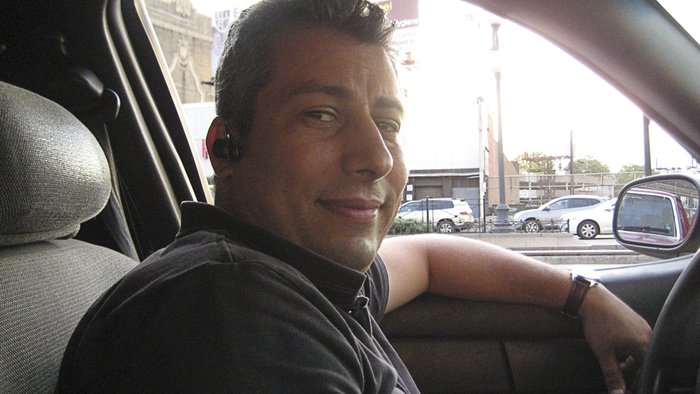When asked if he has ever been robbed or physically assaulted in his 12 years as a cab driver in Jersey City, Eric Kwless, the owner of Alex Taxi, made the sign of the cross over his body and said, “Thank God, no.”
But one of his regular passengers, a young woman who lives on the West Side, said she has seen a cabbie get punched by an angry customer after a dispute over a dropoff location.
“I’ve actually been in the cab with my mom when a guy was sitting in the front and he started punching [the driver],” she recalled.
Cab driver safety was a hot topic of discussion last week at the Journal Square taxi stand in the wake of the July 9 shooting of cabbie Maged F. Rizkallah. According to Jersey City police, Rizkallah picked up a passenger at the Journal Square taxi stand shortly after midnight. Less than 30 minutes later, he was found on Gates Avenue with two gunshot wounds, including one shot to the back of the head.
‘I try to make it easy for the passenger. I don’t want to fight.’ – Kareem Agaybe
____________
After the Jersey City Reporter went to press, Jersey City Police announced that a 21-year-old man had been arrested in the case. The man, who has no fixed address according to police officials, allegedly shot Rizkallah after the two argued about the fare.
The incident has prompted drivers and passengers to debate what measures should be taken to improve cab service and safety in Jersey City. Some drivers are calling for dashboard cameras and taxi stand dispatchers. Passengers and a few drivers are also pushing for the creation of a formal taxi commission similar to the infrastructure that’s in place in Newark and New York City.
Dangerous job
“You know, this guy who got shot, he was robbed a couple months ago,” said Kwless. He says he tries to stay safe by making lots of small talk and eye contact with his customers.
“I got to have eyes and ears in the back of my head all the way until I get to my destination,” he said. “If I hear something funny, 911. I be prepared.”
Cabs in the city are outfitted with emergency lights that drivers can switch on that alert police the driver may be in trouble. But it’s possible that police officers simply won’t see the lights.
Other drivers interviewed last week said they try not to further aggravate angry passengers.
“I try to make it easy for the passenger. If somebody is short a dollar, they don’t have all the fare, I say, ‘Okay, no problem.’ I don’t want to make trouble with nobody,” said Kareem Agaybe, a 10-year taxi veteran who also works at the Journal Square taxi stand. “I don’t want to fight.”
Newark a model?
Given Jersey City’s size and emerging profile as a business hub and destination for tourists, some residents have argued that taxis should be regulated by a commission, as they are in nearby Newark and New York City.
While drivers fear the creation of a taxi commission might lead to laws and requirements that will cost them more money to do business, some of them are beginning to agree that a regulatory structure might serve their interests as well.
“This would make the passenger safe [and] make the driver also safe,” said Agaybe.
Newark’s Taxi Division falls under the Police Department and is managed by Sgt. Hector Corchado. According to Corchado, a seven-member commission oversees the division and sets taxi policy in Newark.
“We have members of the commission who are regular residents and we have two commissioners who are taxi owners who also have experience as drivers in the industry,” said Corchado. “This way we get input from both sides.”
Because taxi policy is collectively set by cab owners and passengers, and includes the involvement of law enforcement, Corchado said safety is always integrated into the city’s taxi codes. Taxi drivers in Newark are currently lobbying the City Council there to abolish the requirement that cabs have a partition, he added. Instead, drivers want the option to have either a partition or a dashboard camera. Cameras, they believe, will further deter would-be criminals from carrying out their crimes.
In contrast to Newark, taxi laws in Jersey City fall under the Division of Commerce, a department that also oversees the Alcoholic Beverage Control Board, towing operations, and franchise regulation.
It is unclear whether city officials would be open to the creation of a separate Taxi Division. When asked what security measures the city planned to implement in the wake of the July 9 shooting, a city spokeswoman said, “The concept of a dashboard camera…is something that the Division of Commerce will review for Jersey City taxis as part of the ongoing taxi study taking place by the city. Additionally, each taxi owner is required to provide the city with a letter of certification that the partition between the driver and the passenger is bullet-resistant.”
‘Understandably nervous’
Syed and John Lynch, a resident who has often been critical of long lines at the Journal Square taxi stand, spent time last week offering sympathy and support to the drivers, who they described as “understandably nervous.” Lynch has often advocated for the creation of a taxi commission in Jersey City.
“A true taxi commission, made up of people who understand first-hand about safety, could give real guidance,” he said. “Our taxi laws here are disorganized. I still see cabs out here that don’t have the bulletproof partition.”
Syed agreed. “There should be a regulatory authority, an institution. There needs to be some kind system in place that can benefit everybody.”
Anyone with information regarding the July 9 shooting is asked to call the Jersey City Police Department at (201) 547-5245.
E-mail E. Assata Wright at awright@hudsonreporter.com.
